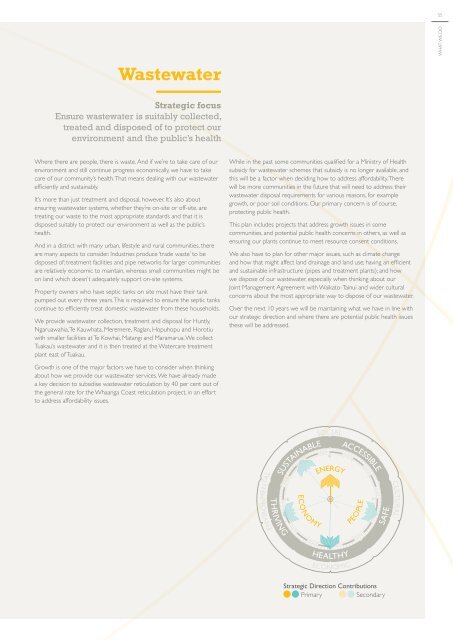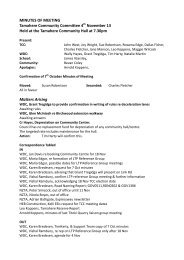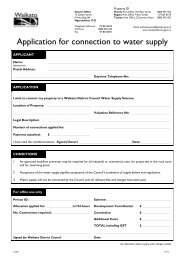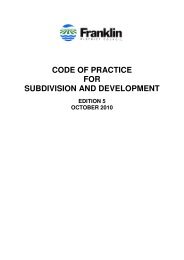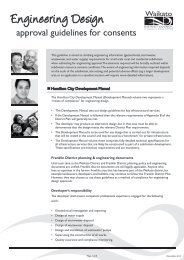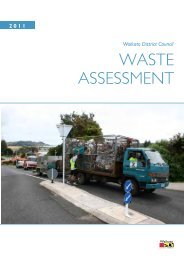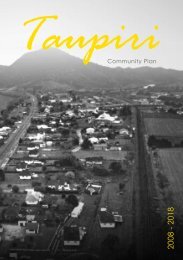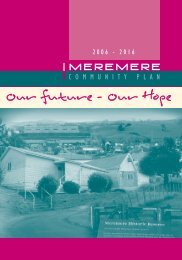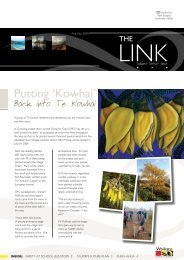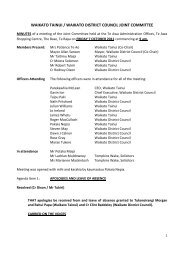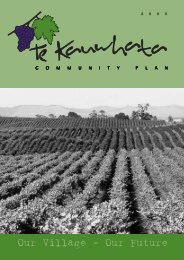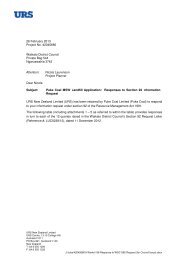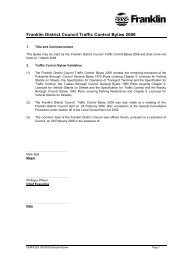1% - Waikato District Council
1% - Waikato District Council
1% - Waikato District Council
- No tags were found...
Create successful ePaper yourself
Turn your PDF publications into a flip-book with our unique Google optimized e-Paper software.
55WastewaterWhat We DoStrategic focusEnsure wastewater is suitably collected,treated and disposed of to protect ourenvironment and the public’s healthWhere there are people, there is waste. And if we’re to take care of ourenvironment and still continue progress economically, we have to takecare of our community’s health. That means dealing with our wastewaterefficiently and sustainably.It’s more than just treatment and disposal, however. It’s also aboutensuring wastewater systems, whether they’re on-site or off-site, aretreating our waste to the most appropriate standards and that it isdisposed suitably to protect our environment as well as the public’shealth.And in a district with many urban, lifestyle and rural communities, thereare many aspects to consider. Industries produce ‘trade waste’ to bedisposed of; treatment facilities and pipe networks for larger communitiesare relatively economic to maintain, whereas small communities might beon land which doesn’t adequately support on-site systems.Property owners who have septic tanks on site must have their tankpumped out every three years. This is required to ensure the septic tankscontinue to efficiently treat domestic wastewater from these households.We provide wastewater collection, treatment and disposal for Huntly,Ngaruawahia, Te Kauwhata, Meremere, Raglan, Hopuhopu and Horotiuwith smaller facilities at Te Kowhai, Matangi and Maramarua. We collectTuakau’s wastewater and it is then treated at the Watercare treatmentplant east of Tuakau.Growth is one of the major factors we have to consider when thinkingabout how we provide our wastewater services. We have already madea key decision to subsidise wastewater reticulation by 40 per cent out ofthe general rate for the Whaanga Coast reticulation project, in an effortto address affordability issues.While in the past some communities qualified for a Ministry of Healthsubsidy for wastewater schemes that subsidy is no longer available, andthis will be a factor when deciding how to address affordability. Therewill be more communities in the future that will need to address theirwastewater disposal requirements for various reasons, for examplegrowth, or poor soil conditions. Our primary concern is of course,protecting public health.This plan includes projects that address growth issues in somecommunities, and potential public health concerns in others, as well asensuring our plants continue to meet resource consent conditions.We also have to plan for other major issues, such as climate changeand how that might affect land drainage and land use; having an efficientand sustainable infrastructure (pipes and treatment plants); and howwe dispose of our wastewater, especially when thinking about ourJoint Management Agreement with <strong>Waikato</strong>-Tainui and wider culturalconcerns about the most appropriate way to dispose of our wastewater.Over the next 10 years we will be maintaining what we have in line withour strategic direction and where there are potential public health issuesthese will be addressed.Strategic Direction ContributionsPrimarySecondary


